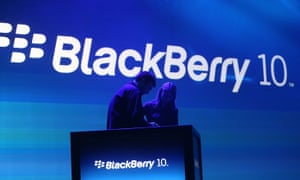
Remember BlackBerry? The one-time giant of smartphones has gone through tumultuous times over the past six years, and become a much smaller software company. Its results last week showed just how small: third-quarter revenues were $226m (£169m), its lowest three-monthly total since 2004, with an operating loss of $258m.
The Canadian company’s chief executive, John Chen, is a turnaround specialist who believes that the future is in self-driving cars, where automakers and software firms alike see huge promise. It is investing hope in QNX, which it bought in 2010: a maker of software that underpins car entertainment and data systems.
That is a long way from the early 2000s, when BlackBerry was one of the world’s biggest smartphone makers and Apple had yet to launch the all-conquering iPhone. A failure to adapt to trends like keyboard-less devices was its undoing as iPhones and Android phones took off. Then came a calamitous multi-billion bet on a new phone operating system, BB10, in 2013. It abandoned handsets altogether last year and the road ahead remains rocky – not least due to the state of its finances.
Nonetheless, analysts see potential in the ashes. The stock jumped from $11 to over $12 last week, as investors liked what they found in the figures: for instance, a new record for revenue from software and services, at $199m. BlackBerry stock is now back at levels it hasn’t seen since mid-2013.
“It’s pretty impressive, beating on both the top and bottom lines,” Ali Mogharabi, an analyst at research firm Morningstar, told Reuters. “The growth specifically in enterprise software is good to see.”
Chen was quietly famous in the business world for having saved Sybase, which had looked in 1998 as if it might wither away. Chen saw that the would-be database company had lost out badly to Oracle, and decided to focus on the “unwired enterprise” – mobile services. That decision allowed Sybase to regain its primacy in new markets; it was sold to the enterprise software giant SAP for $5.8bn in 2010, compared to its market capitalisation when Chen took over of $362m – a 16-fold growth in value in 12 years.
But can he do it again at BlackBerry? In many ways Chen is repeating the formula that saved Sybase: look for new opportunities while letting what remains of the customer base cover other costs. Thus he has focused on the software side, where operating margins often beat 50%, unlike hardware, which often struggles to get into double digits.
Speaking after the results, Chen pointed to new contracts with the US and Dutch governments, and with Nato. BlackBerry’s purchase in September 2015 of Good Technology, which writes software for remote management of smartphones, means it no longer relies on selling its own handsets but can administer everyone else’s. He also suggested that patent licensing could bring in $100m over the financial year – essentially free money, as the patents were often acquired years ago.
But the biggest move may be on “embedded” software, where QNX is a crucial part of a much bigger trend of making cars and other vehicles that run almost entirely on software.
BlackBerry has signed deals with Ford and automotive parts makers such as Denso, Delphi, Bosch and Scion. Talking to the Wall Street Journal, Chen said: “The auto sector is our best chance at revenue growth.” QNX is able to handle real-time events and multiple demands in a way that software used on smartphones or PCs cannot; more than 60 million vehicles were using QNX by the end of 2015.

